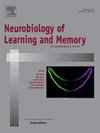Cortisol modulates hippocampus activation during semantic substitution in men
IF 2.2
4区 心理学
Q3 BEHAVIORAL SCIENCES
引用次数: 0
Abstract
In the case of incomplete episodic memory retrieval, semantic knowledge may play a vital role compared to random memory errors in filling in memory gaps (semantic substitution). Stress impairs (episodic) memory retrieval via stress hormones (mainly cortisol) targeting the hippocampus. This preregistered neuroimaging study aimed to examine the neural mechanisms of the interplay between episodic memories and prior knowledge during the reconstruction of a past scenario under elevated cortisol levels in men. During encoding, sixty men prepared a virtual apartment for having guests over by using button presses to interact with household objects (e.g., toasting a slice of bread) that were placed congruently to semantic knowledge (e.g., a coffee machine in the kitchen) or incongruently (e.g., a toaster in the bathroom). One day later, participants received (order randomized, double-blind) either 20 mg of cortisol (n = 30) or a placebo (n = 30) before a recognition task. After identifying objects as old, we included a room recall using a forced-choice question in which room the objects were remembered. For incongruent objects this allowed us to differentiate the involvement of episodic, semantic, or random memory. Cortisol did not impair general recognition memory. The manipulation of stimuli during encoding, as being congruent and interactable (relevant to the goal) appears to be predictive of later accurate room recall. Semantic substitution in case of episodic memory failure was associated with anterior parahippocampal and gyrus rectus activation. Cortisol administration increased hippocampal activation during semantic substitution, suggesting a compensatory effect. The results characterized the neural correlates of semantic substitution and speak for an intertwined view of episodic memory and semantic knowledge, which is further shaped by the stress hormone cortisol.
皮质醇调节男性语义替代过程中的海马体激活。
在不完全情景记忆提取中,语义知识比随机记忆错误更能填补记忆空白(语义替代)。压力通过针对海马体的应激激素(主要是皮质醇)损害(情景性)记忆检索。这项预先登记的神经成像研究旨在研究在皮质醇水平升高的情况下,男性在重建过去情景时情景记忆和先前知识之间相互作用的神经机制。在编码过程中,60名男子准备了一个虚拟的公寓,通过使用按钮与家庭物品(例如,烤一片面包)进行交互,这些物品与语义知识(例如,厨房里的咖啡机)一致或不一致(例如,浴室里的烤面包机)。一天后,参与者在进行识别任务之前接受(顺序随机,双盲)20 毫克皮质醇(n = 30)或安慰剂(n = 30)。在确定物体是旧的之后,我们加入了一个房间回忆,使用一个强制选择问题,在哪个房间里记住了这些物体。对于不一致的物体,这使我们能够区分情景记忆、语义记忆或随机记忆的参与。皮质醇不损害一般识别记忆。在编码过程中对刺激的操纵,作为一致的和可交互的(与目标相关的),似乎可以预测以后准确的房间回忆。情景记忆失败的语义替代与海马旁前部和直回的激活有关。皮质醇管理增加了语义替代期间海马的激活,表明代偿作用。研究结果表明了语义替代的神经相关性,并说明了情景记忆和语义知识的相互交织的观点,这进一步受到应激激素皮质醇的影响。
本文章由计算机程序翻译,如有差异,请以英文原文为准。
求助全文
约1分钟内获得全文
求助全文
来源期刊
CiteScore
5.10
自引率
7.40%
发文量
77
审稿时长
12.6 weeks
期刊介绍:
Neurobiology of Learning and Memory publishes articles examining the neurobiological mechanisms underlying learning and memory at all levels of analysis ranging from molecular biology to synaptic and neural plasticity and behavior. We are especially interested in manuscripts that examine the neural circuits and molecular mechanisms underlying learning, memory and plasticity in both experimental animals and human subjects.

 求助内容:
求助内容: 应助结果提醒方式:
应助结果提醒方式:


